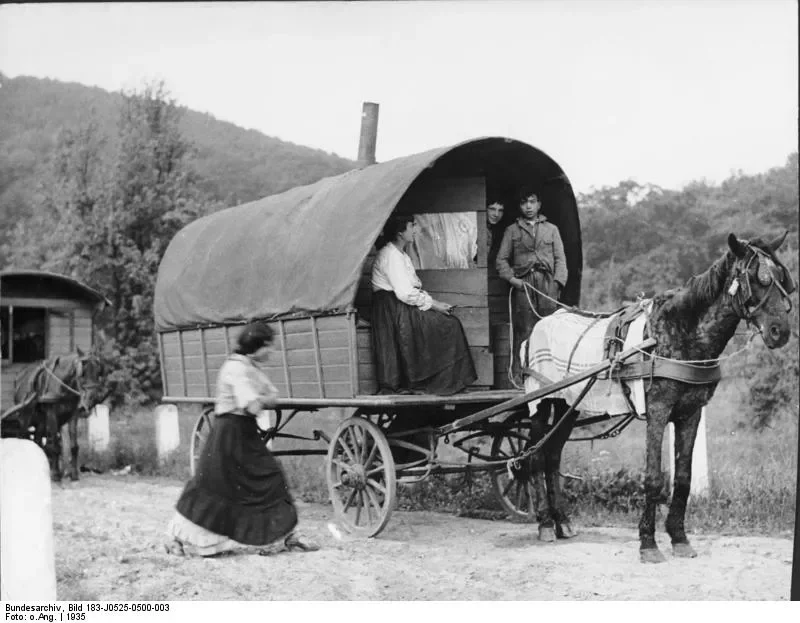Origins and Culture of the Romani People

"The Roma are an ethnic people who have migrated across Europe for a thousand years. The Roma culture has a rich oral tradition, with an emphasis on family." Like Native Americans in the forming United States, the Roma are often called by a term, oft considered derogatory and born of mistaken identity: "Gypsies".
Genetic and linguistic evidence shows that a small population, ancestors of the Roma, probably left India about 1500 years ago. They eventually reached The Balkans and spread throughout Europe.
As nomads by necessity, the Roma are known for travelling, never staying in one place due to discrimination. Romani people often faced discrimination and enslavement by Europeans as a minority group, probably at first due to their darker skin, and continuously as a result of isolation." In 1554, the English Parliament passed a law that made being a Gypsy a felony punishable by death, according to the RSG. The Roma have been portrayed as cunning, mysterious outsiders who tell fortunes and steal before moving on to the next town. In fact, the term “gypped” is probably an abbreviation of Gypsy, meaning a sly, unscrupulous person"
Imagine making it illegal to... be part of an ethnic group that travels. How would you even enforce it? This kind of thing happened because people expected the Roma to be travelling bands of thieves. Romani isolation only served to perpetuate ignorance about their culture.
"In addition to Jews, homosexuals and other groups, the Roma were targeted by the Nazi regime in World War II. The German word for Gypsy, 'Zigeuner' was derived from a Greek root that meant 'untouchable' and accordingly, the group was deemed 'racially inferior.'"
Because of their outsider status, Romani children rarely had the opportunity to attend school and literacy was quite poor among the Roma population. As with much of our own history, a lot of what we know comes from stories and songs passed down the generations.

The Roma don't share one religious faith. Instead, they would usually come, over time, to adopt the spiritual practices of the local cultures they interacted with the most. Some Roma groups are Catholic, Muslim, Pentecostal, Protestant, Anglican or Baptist. However, their isolation and travelling did influence a certain kind of culture among Romani.
"The Roma live by a complex set of rules that govern things such as cleanliness, purity, respect, honor and justice. These rules are referred to as what is "Rromano." Rromano means to behave with dignity and respect as a Roma person, according to Open Society. "Rromanipé" is what the Roma refer to as their worldview."
I believe the fact that they Nomadic cultures only possess what they could take with them influenced some things in their values. You couldn't just own a million random trinkets in your house, so you may have had to really think about what is really valuable to you. Therefor when you carried something for life, it was useful or meant something, right?
Romani are known for displaying wealth proudly. Roma women are known for wearing gold jewelry and head-dresses decorated with coins. Their culture considers it honorable to share one's successes, and hosts will often offer a display of gifts and food to guests. Generosity is seen by the Roma as an investment in a social network which helps everyone when times are tough.

Traveling bands of Roma still exist in modern society, though they usually drive RVs instead of joining caravans of wagons! Other large portions of Romani have settled into homes in stationary society, though due to continued discrimination, often hide their roots from others.
"While there is not a physical country affiliated with the Romani people, the International Romani Union was officially established in 1977. In 2000, The 5th World Romany Congress in 2000 officially declared Romani a non-territorial nation.
During the Decade of Roma Inclusion (2005-2015), 12 European countries made a commitment to eliminate discrimination against the Roma. The effort focused on education, employment, health and housing, as well as core issues of poverty, discrimination, and gender mainstreaming. However, according to the RSG, despite the initiative, Roma continue to face widespread discrimination.
According to a report by the Council of Europe's commissioner for human rights, "there is a shameful lack of implementation concerning the human rights of Roma … In many countries hate speech, harassment and violence against Roma are commonplace."
April 8 is International Day of the Roma, a day to raise awareness of the issues facing the Roma community and celebrate the Romani culture."
It is fascinating and heartbreaking to me that, to this day, we have terms like "Gypsy" in our culture and hold a weird discrimination against certain people who may travel or act differently, because of weird things that happened hundreds of years ago. How can people still be so divided from their fellow humans?
This article was written with the help of information, quotes and images from livescience.com. Read more here!
https://www.livescience.com/64171-roma-culture.html
Post a comment on this or any of my articles with constructive criticism or feedback, and you may get up to $1 of BCH!


"Generosity is seen by the Roma as an investment in a social network which helps everyone when times are tough." This is definitely something more of us could wrap our brains around. Mutual aid mutual aid mutual aid!
Well written, a few random quotation marks in there at points, but no major errors. I'd love to see more direct sources, but I imagine diverse information can be hard to come by when a people are shunned, excluded and erased.